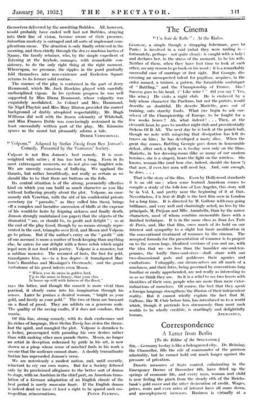!` Volpone." Adapted by Stefan Zweig from Ben Jonson's Comedy,
Presented by the Venturers' Society.
Volpone is not Ben Jonson's best comedy. It is over- weighted with satire ; it has too tart a tang. Even in its most extravagant moments we do not give our laughter rein. We are uneasily conscious of bullying. We applaud the thrusts, but rather breathlessly, not really as certain as we should like to be that there arc buttons on the foils.
Its central situation is of the strong, perennially effective kind on which you can build as much character as you like without bothering greatly about the plot. Volpone, an enor- mously rich Venetian, with the aid of his confidential private secretary (or " parasite," as they called him then), brings off a complex and lucrative succession of bluffs at the expense of his would-be heirs by feigning sickness and finally death. Jonson strongly maintained (on paper) that the objects of the dramatist " are, or should be, to profit and delight " ; so at the end of the play Good, though by no means strongly repre- sented in the cast, triumphs over Evil, and Mosca and Volpone go to prison. But if the author's entry on the " profit " side of our account is more a matter of book-keeping than anything else, he caters for our delight with a fierce relish which might repel were it not fired with poetry. Volpone is a monster, but a sublime monster. The meanest of lusts, the lust for gold, transfigures him, as—to a less degree—it transfigured Mar- lowe's Barabbas and Massinger's Overreach; and the grand turbulence of his greed infects even Mosca.
" When you do swim in golden lard, Up to the arms in honey, that your chin Is borne up stiff with fatness of the flood," says the latter, and though the conceit is more vivid than poetical, it clearly came into his imagination through his senses. Later he praises a desired woman, " bright as your gold, and lovely as your gold." The two of them are buoyant on a flood of greed. They are addicts on a generous scale. The quality of the raving exalts, if it does not condone, their mania.
Of this fine, strong comedy, with its dark exuberance and its riches of language, Herr Stefan Zweig has stolen the theme, lost the spirit, and mangled the plot. Volpone is shrunken to a lecher, preoccupied with parading his own desires rather than with making other men parade theirs. Mosca, no longer an artist in deception redeemed by pride in his art, is now shown as a pimp whose sense of mischief finds in his work a savour that the audience cannot share. A shoddy transatlantic fustian has superseded Jonson's verse.
We are notoriously a modest nation, and, until recently, reluctant to cry our own wares. But for a Society fettered only by its proclaimed allegiance to the better sort of drama to stage, with an Austrian in the chief part, an Anteric4m trans- lation of a German adaptation .of ant English classic of the best period is surely RIRUITIT:8C honk.- If the English drama is indeed dead we have at least a right to be spared such cos-




































 Previous page
Previous page